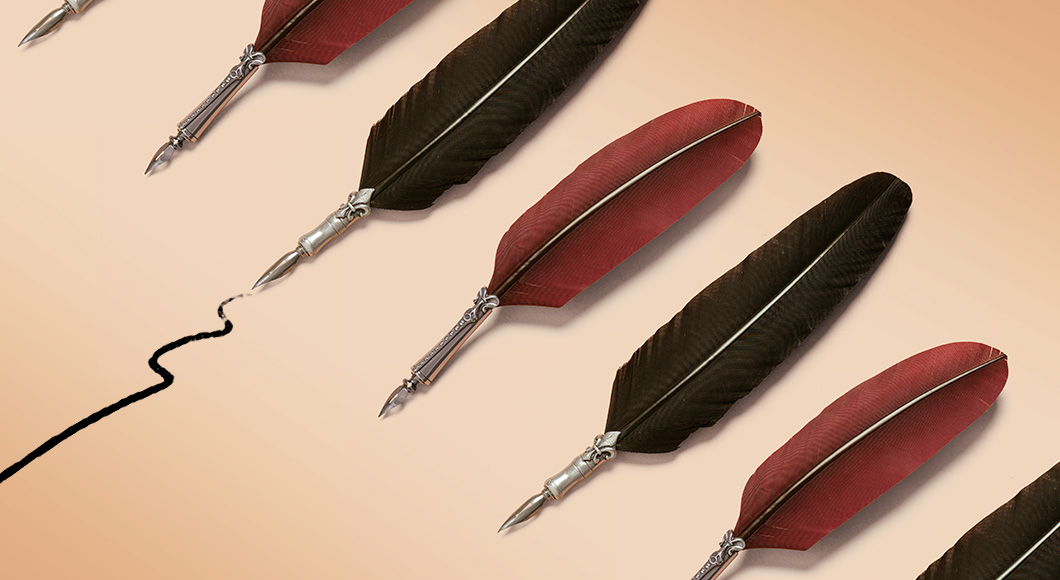
From monumental documents to the Harry Potter series, we’re guessing you’ve seen a feather pen or quill pen in action before—if not in real life, then on the big screen or in a history book. And while today feather pens are little more than novelty items, they were the writing tool of choice for centuries. Keep reading as we take a deep dive into what is a quill pen, from their invention to usage.
Feather pens are more formally known as quill pens—but don’t worry. When you said, “feather pen,” we knew what you meant!
Quill pens originated around the 6th century, and evolved into a popular writing tool during the Middle Ages. They remained a leading writing tool up until the 19th century—used to sign important documents like the Magna Carta (1215) and the Declaration of Independence (1776).
The quill pen came after the reed pen, which was made from bamboo and originated around 3000 BC. The reed pen was created in Egypt after the discovery of papyrus…because what good is paper if you don’t have something to write with?
Aside from the signature feather (more on the feather type later!), quill pens are made with a few other key components. Once you’ve chosen your feather, you’ll need to cut the end to the shape of a traditional pen nib, which should be cut at about a 70-degree angle. You could also bend the nib downward slightly for more precise writing.
The quill pen also has a small slit to control the flow of ink, which is stored in the hollow center of the feather (called the calamus). Quill pens function through capillary action, so if you hold it upside down, the ink won’t come pouring out.
Quill pens were made from just about any kind of large bird features, though swan, geese, and turkey were popular choices. The strongest quills were made from feathers taken from living birds during their new growth period after molting. The best feathers for quill pens were about 12 inches long, and would then be cut down to 8 or 9 inches.
Once you have your quill pen, you’ll need a container of ink to start writing. Start by dipping the quill in the ink to fill the reservoir—each dip will allow you to write around 3-6 words. Hold the quill pen at an angle when you write, minding not to press down on the paper too hard. Once you’re finished writing, it’s important to rinse and dry the nib to preserve the pen.
The quill pen fell in popularity during the rise of the fountain pen. Though the fountain pen was originally invented in 1809, it took a lot of tinkering until it entered the mainstream.
In 1884, Lewis Waterman invented the first-ever ‘modern’ fountain pen design, which used capillary action—the same gravitational method found in quill pens. When applied to a fountain pen, the capillary action allowed pens to regulate ink flow and prevent leaks.
A decade later, George Safford Parker, of the Parker Pen Company, invented and patented a leak-proof version of the fountain pen. Later, the ballpoint pen was invented, and is still the primary pen design used by writers today.
Fun Fact: Did you know Taylor Swift classifies some of her lyrics as quill pen lyrics? Read more about Taylor Swift’s quill pen lyrics.
Sources:
CamelBak® or CORKCICLE®? Klean Kanteen or Koozie®? When it comes to branded drinkware, the options are truly limitless! There are so…
Whether you’re choosing your company colors or just creating a seasonal promotion, your choice of color has a major influence…
Is your perception of recycled or waste-reducing related products stuck in the past? Let’s face it, recycled and waste-reducing promotional…
After the ever-perilous April Fool’s Day passes, what’s left to keep the laughs rolling through the month? Actually, there are…
A high-quality logo is essential for any company that is looking to establish their own brand. However, not everyone is…
Make smaller occasions unforgettable with custom gifts in small batches! Our low minimum promotional items leave a lasting impression while…
We use cookies to provide you with the best experience possible.
Learn more